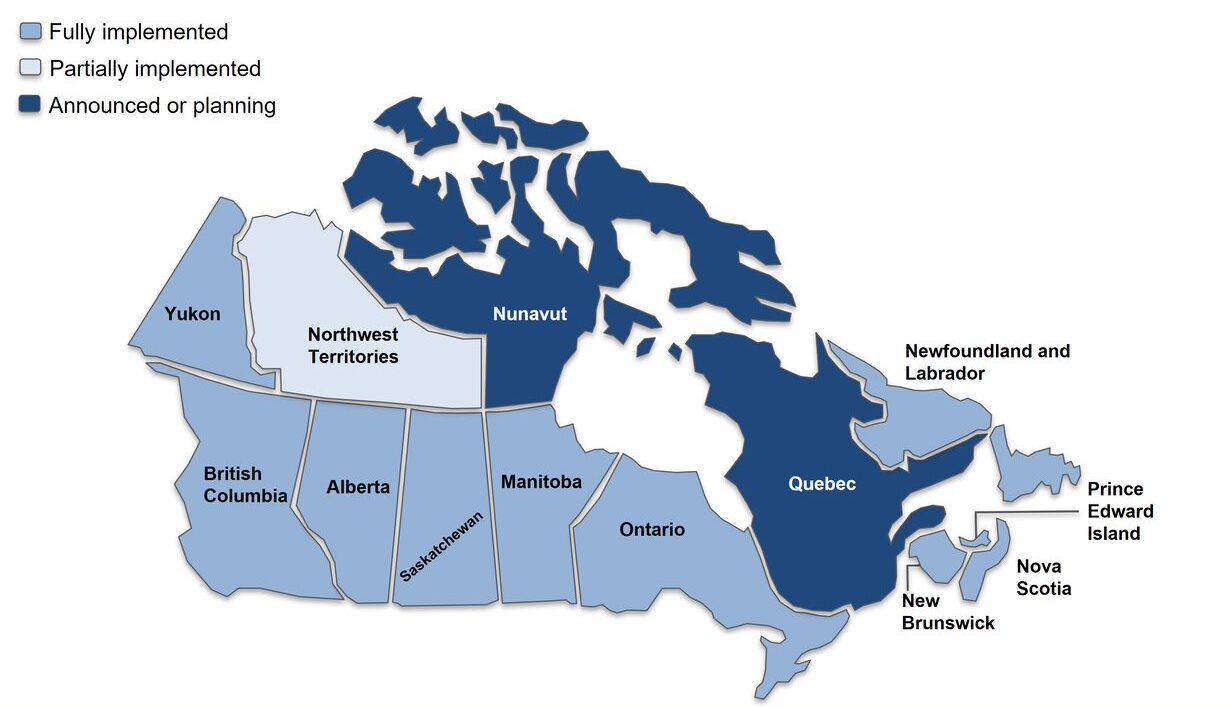Colorectal cancer screening in Canada: 2021/2022
About this section
Organized colorectal screening programs are available in most provinces to individuals who are asymptomatic (no signs or symptoms of colorectal cancer present) and at average risk for colorectal cancer. This section describes colorectal cancer screening programs, guidelines, and recruitment methods in provinces and territories across Canada.
Colorectal screening programs and guidelines
 Currently, nine provinces and two territories have implemented organized colorectal cancer screening (with some regions within provinces and territories still without organized programs). Nunavut and Québec do not currently have organized colorectal screening programs; however, programs are in development in both jurisdictions. Where organized screening programs are not available, screening services are provided opportunistically by a primary care provider.
Currently, nine provinces and two territories have implemented organized colorectal cancer screening (with some regions within provinces and territories still without organized programs). Nunavut and Québec do not currently have organized colorectal screening programs; however, programs are in development in both jurisdictions. Where organized screening programs are not available, screening services are provided opportunistically by a primary care provider.
Colorectal screening programs in Canada

| P/T | Program start date | Program status | Program name | Agency responsible for program administration |
|---|---|---|---|---|
| YT | 2017 | Full program, territory wide | ColonCheck Yukon | Government of Yukon Health and Social Services |
| NT | 2020 | Implemented in 3 of 7 health regions. Launching in remainder of Territory by 2023 | Colorectal Cancer Screening Program | Northwest Territories Health and Social Services Authority |
| NU | Under development | Government of Nunavut Department of Health | ||
| BC | 2013 | Full program, implemented in 4 out of the 5 BC Health Authorities | Colon Screening Program | BC Cancer |
| AB | 2007 | Full program, province wide | Alberta Colorectal Cancer Screening Program (ACRCSP) | Alberta Health Services |
| SK | 2009 | Full program, province wide | Screening Program for Colorectal Cancer | Saskatchewan Cancer Agency |
| MB | 2007 | Full program, province wide | ColonCheck | CancerCare Manitoba |
| ON | 2008 | Full program, province wide | ColonCancerCheck | Ontario Health (Cancer Care Ontario) |
| QC | N/A | Population wide screening program in development. Opportunistic screening at present. |
Programme québécois de dépistage du cancer colorectal (PQDCCR) (Québec Colorectal Cancer Screening Program) | Ministère de la Santé et des Services sociaux (Ministry of Health and Social Services) |
| NB | 2014 | Full program, province wide | New Brunswick Colon Cancer Screening Program | New Brunswick Cancer Network (NB Department of Health) |
| NS | 2009 | Full program, province wide | Colon Cancer Prevention Program | Nova Scotia Health Cancer Care Program |
| PE | 2011 | Full program, province wide | Colorectal Cancer Screening Program | Health PEI |
| NL | 2012 | Full program, province wide | Newfoundland and Labrador Colon Screening Program | Cancer Care Program, Eastern Health |
Three jurisdictions are planning or developing a colorectal cancer screening program.
Northwest Territories
The program rolled out organized screening that involves distributing fecal immunochemical test (FIT) kits to average-risk individuals aged 50 to 74. Distribution started in the Beaufort Delta and is now in its second year in the area. The Sahtu and Hay River regions had kits distributed in spring 2021, and the program is continuously expanding through the rest of the territory.
An ongoing challenge is the local distribution of kits. Collaboration with healthcare workers in communities promotes a higher participation rate and more thorough client education, but time demands on health centre staff make consistent timing difficult.
Nunavut
The Nunavut Department of Health is developing an organized approach to population-based cancer screening, beginning with a phased approach for colorectal cancer screening. An implementation plan and stakeholder engagement plan are being finalized for colorectal cancer screening. An internal steering committee has also been developed and meets regularly. Staffing remains a priority to support the implementation of the screening program.
Quebec
Taking inspiration from the province’s breast cancer screening program (which has been in place since 1998), efforts have been made to define what an organized colorectal cancer screening program should look like. When fully implemented, the program will include:
- FIT test availability for eligible people aged 50 to 74 (in place since 2013)
- enhancement of colonoscopy capacity and implementation of follow-up mechanisms (in place)
- methodology for financing colonoscopy production (in place)
- standard colonoscopy clinic requisitions (in place)
- colonoscopy quality monitoring (partially in place, IT system currently under development)
- invitation letters to eligible population (invitation to be set up, program is currently in opportunistic mode)
- continuous monitoring of the trajectory of people invited to screening and of the invitation cycle (IT system to be set up, in progress)
- assessment of the quality of care, performance and impacts of the screening program activities (ongoing)
Two information systems are considered for the program: one for the monitoring of the screening trajectory and the other for the collection of colonoscopy-related information. Prior to the implementation of the screening program, a reduction of colonoscopy wait times caused by COVID-19 is anticipated.
Many jurisdictions with organized screening programs are implementing changes to their programs.
Manitoba
The program is preparing for the colorectal cancer screening transition from the fecal occult blood test (FOBT) to FIT. With this change, it is expected that ColonCheck will assume all FIT distribution for the province. In preparation, the program is developing relevant screening guidelines, enhancing database registry and IT processes, and reviewing all public and provider resources. In addition, the program is implementing deliverables generated from a Partnership-funded project titled Management for Individuals at Increased Risk of Colorectal Cancer.
The goal is to provide appropriate and timely colorectal cancer screening that is based on risk, as well as post-investigation monitoring to ensure participants are being managed properly. This includes a decision aid tool, personal and family history data collection from screening participants, enhanced result letters that inform and educate on risk, and fail-safe communications.
New Brunswick
A review of the program’s clinical practice guidelines was completed in 2021.
Nova Scotia
The FIT Plus: Better Care, Better Outcomes project is a quality improvement initiative designed to reduce wait times from positive FIT results to colonoscopy and also to expand the responsibility of the province’s Colon Cancer Prevention Program to ensure appropriate follow up for patients with high-risk adenomas.
The program is implementing the following changes to decrease the number of unnecessary FIT tests:
- Participants who tested positive in the previous FIT screening cycle and have either received a colonoscopy or are scheduled for a procedure are identified and removed from the automatic mail-out invitation process.
- Data from endoscopists is integrated in the cancer screening management information system.
- The program is collaborating with primary care providers to identify patients for whom screening is not appropriate.
- Patients who have a FIT colonoscopy will follow a surveillance pathway. The concept of high and low risk adenomas will be adopted.
The project will also implement an organized and centralized approach for follow-up of FIT Plus patients with high-risk lesions, province-wide, within the organized colorectal cancer screening program.
Ontario
Ontario Health (Cancer Care Ontario) is focusing on stabilizing trends following the FIT launch in 2019 and the onset of the COVID-19 pandemic in 2020. A pilot program is underway to improve access to colorectal cancer screening in Sioux Lookout Zone First Nation communities by having FIT kit inventory available at nursing stations and health centres.
Prince Edward Island
Screening guidelines follow a routine review cycle of two years and were under review in November 2021. The Colorectal Cancer Diagnostic Navigation Project will be developed and tested to support the early and rapid diagnosis of colorectal cancer.
